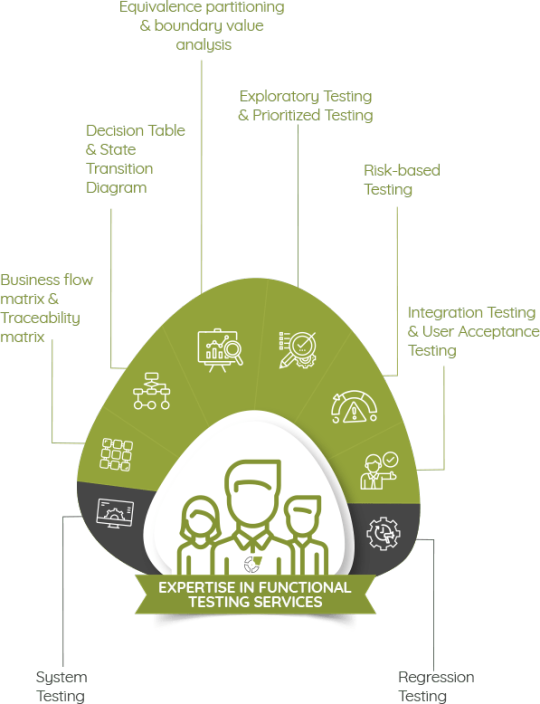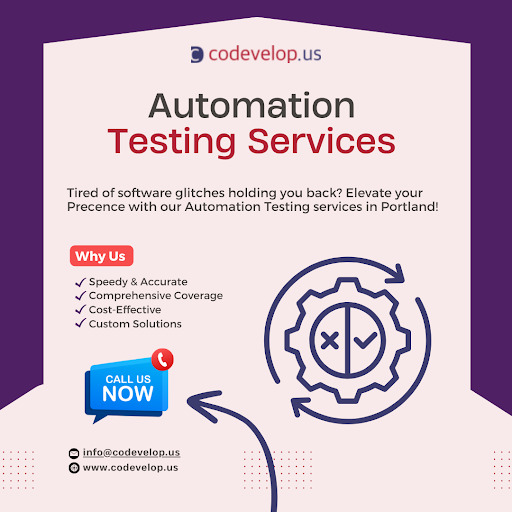#Automation Testing Services
Explore tagged Tumblr posts
Text
2 notes
·
View notes
Text
How to Build an Efficient Test Automation Strategy
In today’s fast-paced software development environment, manual testing can no longer keep up with the demand for speed, accuracy, and scale. Automation testing has become essential for ensuring high-quality software while improving efficiency. However, building an efficient test automation strategy requires careful planning and execution. Below are key steps to consider when creating an effective test automation strategy.
1. Define Clear Objectives
Before diving into automation, it's crucial to define the objectives of your automation testing strategy. Understand what you hope to achieve: faster release cycles, better coverage, or reduced human error. Identifying the key goals will help guide the tools, frameworks, and testing approaches you choose.
Some objectives might include:
Reducing time to market
Improving regression testing efficiency
Increasing test coverage across multiple platforms
Ensuring faster feedback for developers
2. Select the Right Tools
Choosing the right tools is essential to the success of your automation testing services. The tools should align with the technology stack you're using and the scope of your testing needs. Consider tools for functional testing, performance testing, API testing, and cross-browser testing.
Popular automation testing tools include:
Selenium: Widely used for web application automation.
JUnit/NUnit: Ideal for unit testing in Java or .NET applications.
Appium: Used for automating mobile application testing.
TestComplete: A comprehensive test automation tool that supports a wide range of applications.
Jenkins: Integrates with various test automation tools and supports continuous integration.
When choosing tools, consider factors such as ease of use, integration capabilities with CI/CD pipelines, and support for parallel execution. For businesses looking for the best automation testing services, PrimeQA Solutions is among the top-rated automation testing companies, providing excellent tools and services tailored to different business needs.
3. Choose the Right Tests to Automate
Not all tests are suitable for automation. It's essential to identify which types of tests will provide the most value when automated. The most commonly automated tests are:
Regression tests: These tests ensure that new changes haven’t introduced bugs in the system.
Smoke tests: Basic tests that ensure the software is stable enough for further testing.
Data-driven tests: Testing different input sets to verify the system’s ability to handle varying data.
Avoid automating tests that are executed rarely or those that are highly complex and likely to change frequently. These tests may not provide sufficient ROI when automated. API automation testing is another area that can save significant time when integrated into the testing strategy.
4. Design a Robust Test Automation Framework
A test automation framework is a set of guidelines or best practices that ensures consistency and maintainability in your automated tests. A well-designed framework will help reduce code duplication, improve code readability, and make it easier to maintain tests in the long run.
There are several types of frameworks to choose from, including:
Keyword-driven Framework: Separates the test logic from the test data and keywords, making tests more readable.
Data-driven Framework: Tests are designed to run with multiple sets of input data, improving coverage.
Modular Framework: Breaks tests into reusable modules for better maintainability.
Hybrid Framework: Combines elements from multiple frameworks to optimize for different needs.
Ensure that the framework supports continuous integration (CI) tools and is easy to scale as your test suite grows. A test automation framework that integrates well with API automation testing can significantly improve overall testing efficiency.
5. Implement Continuous Integration (CI) and Continuous Testing
Automating tests in isolation won't bring significant benefits unless integrated into the development lifecycle. Continuous Integration (CI) is a practice where code changes are automatically tested through the build pipeline every time a developer commits code. This ensures that tests are run frequently and bugs are detected early.
Continuous Testing (CT) ensures that tests are executed in every stage of the development pipeline, including pre-production, to guarantee that software quality is maintained. Integrating your test automation suite with a CI/CD pipeline ensures that automated tests are executed quickly and results are available promptly.
6. Maintain Test Scripts Regularly
Test automation isn’t a one-time task. As software evolves, so should your tests. Regular maintenance is essential to keep tests up-to-date with application changes, eliminating outdated tests and adding new ones to cover new functionality. Implementing test reviews and updating tests during each sprint or release cycle will keep your automated test suite relevant.
7. Measure and Optimize Test Automation
Once your test automation strategy is in place, it's crucial to measure its effectiveness. Metrics such as test execution time, the percentage of tests passed/failed, and the overall impact on the release cycle should be tracked. Use these insights to optimize the automation testing strategy further.
Improving automation efficiency could involve optimizing test scripts, parallelizing tests to run on multiple environments, or refining the CI/CD pipeline to reduce bottlenecks. A skilled automation tester can help identify and eliminate inefficiencies in the process, ensuring faster and more reliable testing.
Conclusion
An efficient test automation strategy is a blend of clear objectives, the right tools, well-designed frameworks, and continuous optimization. By following these steps, you can ensure that your test automation efforts deliver consistent, reliable results, reduce manual effort, and accelerate software delivery without compromising quality. Automation testing is a continuous journey, and constant refinement and measurement are key to its success.
For businesses looking to scale their testing efforts and achieve the highest standards, partnering with top automation testing companies like PrimeQA Solutions can significantly enhance the efficiency of your automation testing services, helping you achieve better results with reduced effort.
0 notes
Text
In this podcast, we explore the benefits of Test Automation Services and how they accelerate software testing. Learn how Impressico Business Solutions, an expert Automation Testing Company, leverages advanced tools to deliver efficient, scalable, and high-quality testing solutions to help businesses achieve seamless application performance.
#Test Automation Services#Automation Testing Company#Automated Testing Services#Automation Testing Services
0 notes
Text
0 notes
Text
Looking for QA and Testing Services company in India Hire a QA Tester from our reputable company We provide comprehensive quality assurance solutions to ensure your software products meet the highest standards.
#QA and Testing Services#QA and Testing Company#Automation Testing Services#Manual Testing Services#Mobile App Testing Services
0 notes
Text

Comprehensive Quality Assurance Services for Optimal Software Performance Explore our infographic to discover how our comprehensive Quality Assurance services ensure optimal software performance. Learn about our systematic approach to testing and quality control, designed to identify and resolve defects, enhance functionality, and deliver a seamless user experience. Our services include functional testing, performance testing, security testing, and more to guarantee your software meets the highest standards of quality and reliability. Visit our website to find out more about how we can help your business achieve its software quality goals.
#quality assurance services#quality assurance#functional testing#functional testing services#best functional testing services#automation testing#automation testing services#best automation testing services
1 note
·
View note
Text
Benefits of Outsourcing Automation Testing
In today's rapidly evolving business landscape, ensuring the quality and reliability of software applications has become more crucial than ever. Automation testing has emerged as a powerful solution to enhance the testing process's efficiency, accuracy, and speed. However, adopting automation testing in-house can be a challenging endeavour for many organisations due to the need for specialised skills and resources. This is where outsourcing automation testing comes into play.
Outsourcing automation testing is a strategic move that offers a myriad of benefits to businesses seeking to optimise their software testing processes. In this comprehensive guide, we will explore the advantages of outsourcing automation testing and provide actionable tips and real-life case studies to showcase its effectiveness.
The Case for Outsourcing Automation Testing
Before delving into the benefits, let's first understand the rationale behind outsourcing automation testing.
The Growing Complexity of Testing
Software applications today are increasingly complex, spanning various platforms, devices, and operating systems. Ensuring compatibility, functionality, and performance across this diversity requires specialised skills and resources that many organisations lack in-house.
Cost-Effective Resource Allocation
Building an in-house automation testing team involves significant recruitment, training, and infrastructure costs. Outsourcing allows businesses to access the expertise they need without the long-term financial commitment.
Focus on Core Competencies
By outsourcing non-core functions like automation testing, companies can redirect their internal resources and attention toward their core business activities, driving innovation and growth.
Now that we've established the rationale, let's delve into the concrete benefits of outsourcing automation testing:
1. Expertise and Specialization
When you outsource automation testing services, you gain access to a team of skilled professionals who specialise in testing. These experts bring extensive knowledge of testing tools, frameworks, and best practices, ensuring that your software is rigorously and comprehensively tested.
Case Study: A leading e-commerce company outsourced their automation testing services to a specialised QA firm. The result? They reduced critical defects by 40% and improved the overall quality of their application, leading to increased customer satisfaction and higher conversion rates.
Actionable Tip: When choosing an outsourcing partner, evaluate their expertise and track record in automation testing. Request case studies and references to gauge their capabilities.
2. Cost Savings
Outsourcing automation testing can significantly reduce your testing costs. You eliminate the need to invest in hardware, software licences, and ongoing training for your in-house team. Moreover, outsourcing partners often offer flexible pricing models, allowing you to scale your testing efforts up or down as needed.
Case Study: A mid-sized software development firm reduced their testing costs by 30% by outsourcing their automation testing services. These cost savings enabled them to invest in research and development, leading to the launch of a new, revenue-generating product.
Actionable Tip: Analyse your current testing expenses and compare them to outsourcing quotes to determine potential cost savings.
3. Faster Time-to-Market
Outsourcing automation testing accelerates your software development lifecycle. Automation tools can execute test cases much faster than manual testing, leading to quicker bug identification and resolution. This agility is especially critical in today's competitive business landscape.
Case Study: A software startup outsourced their automation testing, enabling them to release updates twice as fast. This rapid pace of development allowed them to respond quickly to user feedback, gaining a competitive edge in the market.
Actionable Tip: Collaborate closely with your outsourcing partner to ensure seamless integration of automated testing into your development process.
4. Scalability and Flexibility
Outsourcing allows you to scale your testing efforts up or down based on project requirements. Whether you're launching a new product, handling seasonal demand spikes, or maintaining legacy applications, you can adjust your testing resources accordingly.
Case Study: A global financial institution scaled their automation testing resources during a major system upgrade, ensuring uninterrupted service for their customers. Once the project was completed, they scaled down their testing team, optimizing costs.
Actionable Tip: Maintain open communication with your outsourcing partner to align testing resources with your project needs.
5. Improved Test Coverage
Automation testing can cover a vast range of test cases, including regression testing, performance testing, and security testing, with precision and consistency. This comprehensive coverage reduces the risk of undetected defects making their way into production.
Case Study: A healthcare software provider outsourced automation testing to ensure HIPAA compliance. The automated tests identified vulnerabilities that manual testing had missed, helping the company avoid regulatory penalties and maintain patient data security.
Actionable Tip: Collaborate with your outsourcing partner to define clear test cases and priorities to maximise test coverage.

6. Enhanced Quality
Consistent and thorough automation testing enhances the overall quality of your software. By identifying and addressing issues early in the development process, you reduce the likelihood of critical defects reaching your end-users.
Case Study: An e-learning platform outsourced automation testing and saw a 25% reduction in customer-reported bugs. This improvement led to higher user satisfaction and retention rates.
Actionable Tip: Regularly review testing reports and collaborate with your outsourcing partner to continuously improve testing strategies.
7. Focus on Strategic Initiatives
Outsourcing automation testing frees up your internal team to concentrate on strategic initiatives, such as innovation, product development, and market expansion. This shift in focus can have a profound impact on your organisation's long-term growth.
Case Study: A technology company outsourced their automation testing, allowing their in-house team to innovate and launch a groundbreaking product that revolutionised their industry.
Actionable Tip: Identify areas where your internal team's expertise can drive innovation, and allocate resources accordingly.
Conclusion
Outsourcing automation testing is a strategic decision that offers a multitude of benefits for businesses. It provides access to expertise, cost savings, faster time-to-market, scalability, improved test coverage, enhanced quality, and the ability to focus on strategic initiatives.
When considering outsourcing, evaluate potential partners carefully, and ensure they align with your business goals and values. By harnessing the power of outsourcing automation testing, you can optimise your software testing processes, enhance product quality, and drive business growth in today's competitive landscape.
#automation testing#outsource automation testing services#automation testing company#automation testing services
0 notes
Text
Navigating Quality Challenges: BugRaptors' Insight into Automation Testing Services
Automation testing is a game-changer in the field of quality assurance, improving testing speed and accuracy. Across the software, mobile, online, and artificial intelligence testing domains, BugRaptors, a top QA testing business, strategically uses automation testing. This methodology works best with specialized tools and scripts that allow it to carefully carry out test cases and guarantee thorough coverage.
The automation testing services offered by BugRaptors put efficiency first, accelerating workflows without sacrificing quality. Regression testing accuracy is prioritized to protect current features, and automation's low cost maximizes resource use. Customized tactics, scalability, and an accomplished group of automation engineers distinguish BugRaptors. They offer more than simply testing solutions; they also guarantee quality, which clears the path for smooth software deployment.
0 notes
Text
Mastering Automation Testing: India's Cutting-Edge Approach
Eqanim offers comprehensive insights and advanced solutions for automation testing in India, empowering businesses to optimize their testing procedures and ensure top-notch performance
1 note
·
View note
Text

Codvelop Automation Testing Services in Portland stands out with its exceptional proficiency in test automation. We specialize in crafting tailor-made automation solutions, aligning perfectly with each client's unique needs and technology stack. What sets Codvelop apart is its deep understanding of industry-specific challenges, allowing them to deliver precise, efficient, and cost-effective testing services. Their team of seasoned professionals combines cutting-edge tools and methodologies, ensuring rapid identification of defects and improved software quality. Codvelop's commitment to continuous innovation and adaptability positions as the go-to partner for businesses seeking unparalleled expertise in automation testing within the vibrant tech landscape of Portland.
0 notes
Text
#automation testing services#automation testing company#software testing services#software testing company
1 note
·
View note
Text
How to make Selenium testing more efficient with Docker

The reliability and compatibility of web applications across different environments are crucial. Docker, a popular containerization platform, offers a streamlined way to achieve this by providing a consistent testing environment.
In 2022, Docker accounted for 27 percent market share of the containerization technologies market. – Statista
What is Docker?
Docker is an open-source platform that automates the deployment of applications in lightweight portable containers. These containers package applications and their dependencies together, ensuring consistency across different environments.
Why to use Docker for Selenium testing
Isolation: Each test runs in a separate container, preventing interference between tests.
Consistency: The testing environment is consistent across different machines and environments.
Efficiency: Tests can be parallelized easily using Docker, reducing execution time.
Scalability: Docker allows you to scale up your testing infrastructure effortlessly.
Using Docker for application compatibility
You need to ensure that your application is compatible with different browsers (e.g., Chrome, Firefox) and different versions of those browsers. Additionally, as your application’s functionality grows, multiple tests need to be run concurrently to maintain efficiency.
Benefits of leveraging Docker
Regression testing: It is a process of testing your application to ensure that it still works correctly after changes have been made to it. By using Docker, you can create a consistent environment for regression testing, which can help you identify and fix bugs more quickly.
Parallel test execution: Docker can help you run multiple tests in parallel, which can significantly reduce the time it takes to execute all your tests. This is especially beneficial for large test suites that can take a long time to execute.
Consistent environment: Docker creates isolated environments for each test, which ensures that each test runs in a clean environment that is free of any dependencies or configurations from other tests. This can help prevent test failures caused by environmental factors.
Scalability: You can easily add or remove containers as needed. This can be helpful if you need to increase the number of tests that you are running or if you need to test on many browsers or devices.
Reduced test execution time: Docker can help reduce the time it takes to execute tests by sharing resources between containers and caching dependencies. This can be a significant benefit for large test suites that can take a long time to execute.
Setting up your environment with Docker
– Installing Docker
To get started, install Docker on your machine by following the instructions on the official Docker website (https://www.Docker.com/).
– Creating a Selenium Test Suite
Develop a Selenium test suite using your preferred programming language (Java, Python, etc.) and testing framework (JUnit, TestNG, etc.). Ensure your tests are organized and ready for execution.
-Configure Docker Compose file
Docker Compose is a tool for defining and running multi-container Docker applications. Create a Docker Compose YML file to configure your container and any other services like Selenium Grid and web browsers like Firefox, Chrome, etc.
– Example of Docker-compose.yml
version: “3” services: Chrome: image: selenium/node-chrome:latest shm_size: 2gb depends_on: – selenium-hub environment: – SE_EVENT_BUS_HOST=selenium-hub – SE_EVENT_BUS_PUBLISH_PORT=4442 – SE_EVENT_BUS_SUBSCRIBE_PORT=4443
Firefox: image: selenium/node-firefox:latest shm_size: 2gb depends_on: – selenium-hub environment: – SE_EVENT_BUS_HOST=selenium-hub – SE_EVENT_BUS_PUBLISH_PORT=4442 – SE_EVENT_BUS_SUBSCRIBE_PORT=4443
Selenium-hub: image: selenium/hub:latest container_name: selenium-hub ports: – “4442:4442” – “4443:4443” – “4444:4444”
You can expand upon this file to include more browser nodes or additional services as needed. Each browser node service should link to the Selenium-hub service to establish communication.
Navigate to the directory containing the compose file and run the “Docker compose -f Docker-compose.yml up” command.
This will start the Selenium hub and the specified browser nodes. You can then configure your Selenium test suite to connect to the Selenium hub at the specified URL http://localhost:4444 and distribute the tests among the available browser nodes.
– Configure Selenium code for execution in the remote web driver DesiredCapabilities chromeCapabilities = DesiredCapabilities.chrome(); // Set any desired capabilities here URL hubUrl = new URL("http://<selenium-hub ip>:4444/wd/hub"); // URL of the Selenium Grid prepared in container. If you have set up Docker in local, then the Selenium hub URL will be http://localhost:4444. WebDriver driver = new RemoteWebDriver(hubUrl, chromeCapabilities ); Copy
– Execute the test
When you run your tests, Selenium will route the commands to the appropriate browser node based on the desired capabilities. The tests will be executed in Docker containers.
Offer better quality software products with QA automation
Docker provides an effective solution for executing Selenium tests in a controlled and reproducible environment. By containerizing your tests, you can achieve consistency, efficiency, and scalability in your testing processes. Ensure the quality of your web applications by integrating Docker into your testing workflow.
Softweb Solutions is one of the leading providers of QA automation services. We automate testing processes to improve quality, efficiency, and scalability for businesses of all sizes. We have a team of experienced QA engineers who are experts in Docker and Selenium. We can help you set up a Docker-based Selenium environment and automate your tests. We also offer training and support to help you get the most out of Docker for Selenium testing.
Originally published at www.softwebsolutions.com on September 1st, 2023.
#QA automation services#Benefits of Test Automation#automation testing services#test automation services#qa automation
0 notes
Text
Discover how QA automation services can transform your software development process. Join them as they discuss the benefits of automation testing, share insights from experts at Impressico Business Solutions, and explore how their tailored solutions ensure high-quality software that meets your business needs efficiently and effectively.
#Automation Testing Company#Automated Testing Services#Automation Testing Services#QA Automation Services#Software Testing Company
0 notes
Text
0 notes
Text
Discover why QA testing services are crucial for websites and mobile apps. Ensure quality, enhance user experience, and prevent bugs with professional QA testing. Learn more about its importance now!
#QA and Testing Services#QA and Testing Company#Automation Testing Services#Manual Testing Services#Mobile App Testing Services
0 notes
Text

Looking For Reliability with Automated Testing Services
Ensure your software's performance, functionality, and security with cutting-edge automated testing services. Their expert team will streamline your testing process, saving you time and resources while delivering top-notch results. Visit the website.
0 notes